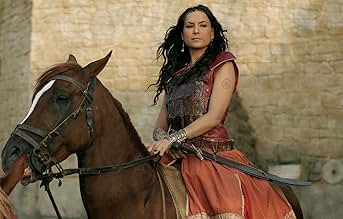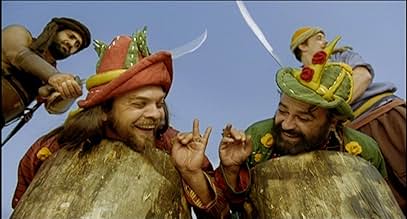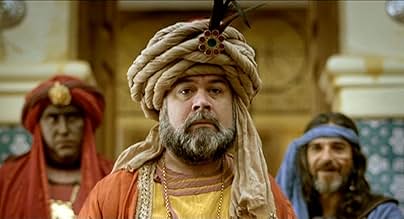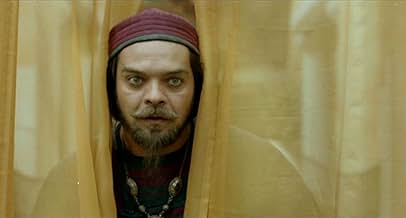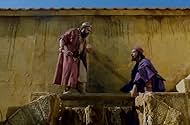Hacivat Karagöz Neden Öldürüldü?
- 2006
- 2 h 15 min
AVALIAÇÃO DA IMDb
7,5/10
14 mil
SUA AVALIAÇÃO
Adicionar um enredo no seu idiomaA story about the tragedy and the danger of humor and the humorist - A comedy as grand as the Lands of Rome.A story about the tragedy and the danger of humor and the humorist - A comedy as grand as the Lands of Rome.A story about the tragedy and the danger of humor and the humorist - A comedy as grand as the Lands of Rome.
- Direção
- Roteiristas
- Artistas
- Prêmios
- 9 vitórias e 7 indicações no total
Aysen Gruda
- Ana
- (as Ayşen Guruda)
- Direção
- Roteiristas
- Elenco e equipe completos
- Produção, bilheteria e muito mais no IMDbPro
Enredo
Você sabia?
- CuriosidadesKirakosyan used the fire as key light at night scenes.
- Trilhas sonorasDört Kitabin Manasi
(The Meaning of Four Books)
Performed by Haluk Bilginer & Sebnem Dönmez
Music composed by Ender Akay
Avaliação em destaque
"Karagoz Hacivat Neden Olduruldu" is Akay and Kazak's take of the legendary personalities Karagoz and Hacivat who are the main characters of Turkish shadow theater. Although their life stories are not known, Akay and Kazak tell a very plausible story that could easily be true. True or not, their story fits exactly what they symbolize - the synthesis of crude and sophisticated humor freely targeting dishonesty, corruption, unfairness and inequality in society.
The setting is the early 14th century, when Byzantian and Seljuk Empires were in shambles following the destructive Mongolian invasion. At the Muslim/Christian borderlands, and out of the reach of the now weakening Mongolian power, the Ottoman State is at its infancy, rapidly expanding at the expense of the neighboring Byzantian and Turkish principalities. Since the cultural homogenization is not as fast as military conquests, a colorful, eclectic intermixing of cultures is underway. This is the perfect breeding ground for the elements Akay seems to take his inspirations from, and he weaves them into his story so masterfully.
Ezel Akay seems to reach his maturity at a very early stage. With his second movie, he already has a signature style and an efficient formula to make the audience laugh and cry with only a snap of a finger. He has absolute emotional control over the audience, thanks to his masterful use of visuals and music.
He also owes a lot to Haluk Bilginer (Karagoz), who is an acting genius. (His talents seem to include Mongolian throat singing if my ears did not deceive me). Beyazit Öztürk (Hacivat) is not as talented an actor, but he is the wisest choice for the role. Another good casting is Güven Kirac as the villain. He has such a wide acting range, he gave me the impression that he could have played almost all the roles in the movie.
Like Akay's earlier movie 'Neredesin Firuze', the music is outstanding - Central Asian Turko-Mongolian tunes yet to be "contaminated" by Middle Eastern influences, beginning to clash with already eclectic Eastern Roman-Judaic melodies. The dynamic synthetic nature of the music parallels with the cultural synthesis what early Ottoman state and society building is all about.
The setting is the early 14th century, when Byzantian and Seljuk Empires were in shambles following the destructive Mongolian invasion. At the Muslim/Christian borderlands, and out of the reach of the now weakening Mongolian power, the Ottoman State is at its infancy, rapidly expanding at the expense of the neighboring Byzantian and Turkish principalities. Since the cultural homogenization is not as fast as military conquests, a colorful, eclectic intermixing of cultures is underway. This is the perfect breeding ground for the elements Akay seems to take his inspirations from, and he weaves them into his story so masterfully.
Ezel Akay seems to reach his maturity at a very early stage. With his second movie, he already has a signature style and an efficient formula to make the audience laugh and cry with only a snap of a finger. He has absolute emotional control over the audience, thanks to his masterful use of visuals and music.
He also owes a lot to Haluk Bilginer (Karagoz), who is an acting genius. (His talents seem to include Mongolian throat singing if my ears did not deceive me). Beyazit Öztürk (Hacivat) is not as talented an actor, but he is the wisest choice for the role. Another good casting is Güven Kirac as the villain. He has such a wide acting range, he gave me the impression that he could have played almost all the roles in the movie.
Like Akay's earlier movie 'Neredesin Firuze', the music is outstanding - Central Asian Turko-Mongolian tunes yet to be "contaminated" by Middle Eastern influences, beginning to clash with already eclectic Eastern Roman-Judaic melodies. The dynamic synthetic nature of the music parallels with the cultural synthesis what early Ottoman state and society building is all about.
- ulnoyman
- 28 de jun. de 2006
- Link permanente
Principais escolhas
Faça login para avaliar e ver a lista de recomendações personalizadas
- How long is Killing the Shadows?Fornecido pela Alexa
Detalhes
- Data de lançamento
- País de origem
- Central de atendimento oficial
- Idioma
- Também conhecido como
- Killing the Shadows
- Locações de filme
- Empresa de produção
- Consulte mais créditos da empresa na IMDbPro
Bilheteria
- Orçamento
- US$ 3.500.000 (estimativa)
- Faturamento bruto mundial
- US$ 3.004.541
- Tempo de duração2 horas 15 minutos
- Cor
- Mixagem de som
- Proporção
- 1.85 : 1
Contribua para esta página
Sugerir uma alteração ou adicionar conteúdo ausente

Principal brecha
By what name was Hacivat Karagöz Neden Öldürüldü? (2006) officially released in Canada in English?
Responda
